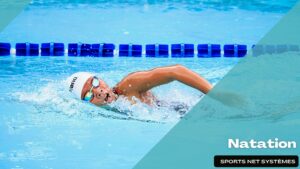 The tapering strategy used by many swimmers to optimize competition performance has been defined as « a progressive non-linear reduction of the training load during a variable period of time, in an attempt to reduce the physiological and psychological stress of daily training and optimize sports performance » (Mujika & Padilla 2000). The aim of the taper before the main competitions of the season is to elicit substantial improvements in performance. These performance gains have been variously attributed to increased levels of muscular force and power (Trappe et al. 2000), and improvements in neuromuscular, hematological, and hormonal function, and/or the psychological status of the swimmer (Mujika & Padilla 2000).
The tapering strategy used by many swimmers to optimize competition performance has been defined as « a progressive non-linear reduction of the training load during a variable period of time, in an attempt to reduce the physiological and psychological stress of daily training and optimize sports performance » (Mujika & Padilla 2000). The aim of the taper before the main competitions of the season is to elicit substantial improvements in performance. These performance gains have been variously attributed to increased levels of muscular force and power (Trappe et al. 2000), and improvements in neuromuscular, hematological, and hormonal function, and/or the psychological status of the swimmer (Mujika & Padilla 2000).
The main features of the taper include a systematic 3-4 week reduction in training volume, ongoing aerobic work to maintain basic fitness and develop race fitness, and fine tuning of race pace and pacing strategies through use of descending sets, broken swims, and time trials. Training volume is gradually reduced reaching about 20% of the peak weekly mileage at the time of competition. The conventional wisdom in the swimming community holds that male and sprint swimmers generally require a longer taper than female and distance swimmers respectively.
A study of the taper of swimmers competing at the 2000 Olympic Games revealed a mean performance improvement of 2.2 ± 1.5% (range -1.1 to 6.0%) over the final 3 weeks of training (Mujika etal. 2002). A total of 91 out of the 99 analyzed performances were faster at the Olympic Games after the taper and only 8 were slower. The percentage improvement in performance time was greater in the males (2.6 ± 1.5%) (mean standard deviation) than the females (1.8 ± 1.5%). The improvement of -2% in performance with the taper similar for all Olympic events and was achieved by swimmers from different countries and performance levels. This information provides a quantitative framework for coaches and swimmers to set realistic performance goals based on individual performance levels.







